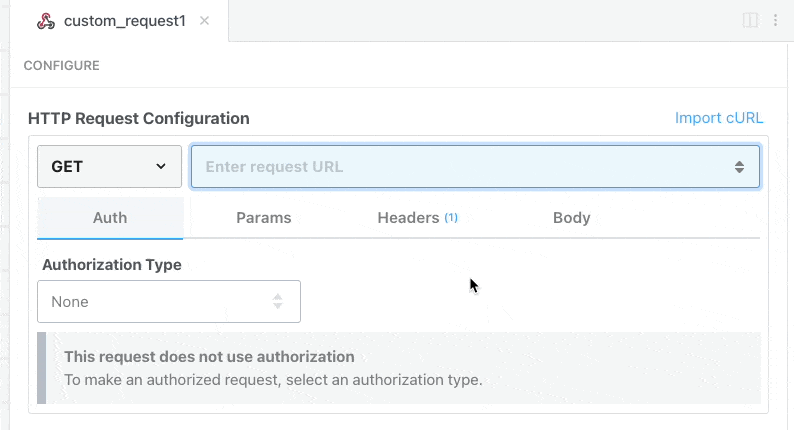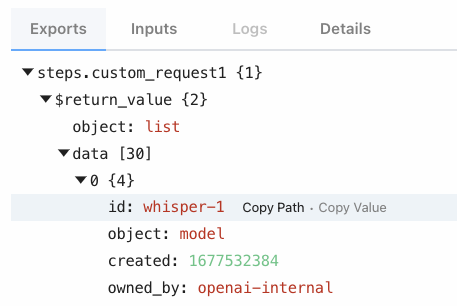import { parseObject } from "../../common/utils.mjs";
import zohoBooks from "../../zoho_books.app.mjs";
export default {
key: "zoho_books-create-invoice",
name: "Create Invoice",
description: "Creates an invoice for your customer. [See the documentation](https://www.zoho.com/books/api/v3/invoices/#create-an-invoice)",
version: "0.3.1",
annotations: {
destructiveHint: false,
openWorldHint: true,
readOnlyHint: false,
},
type: "action",
props: {
zohoBooks,
customerId: {
propDefinition: [
zohoBooks,
"customerId",
],
description: "ID of the customer the invoice has to be created.",
},
invoiceNumber: {
type: "string",
label: "Invoice Number",
description: "Search invoices by invoice number. Max-length [100]",
optional: true,
},
placeOfSupply: {
propDefinition: [
zohoBooks,
"placeOfSupply",
],
optional: true,
},
vatTreatment: {
propDefinition: [
zohoBooks,
"vatTreatment",
],
optional: true,
},
referenceNumber: {
type: "string",
label: "Reference Number",
description: "The reference number of the invoice.",
optional: true,
},
templateId: {
propDefinition: [
zohoBooks,
"templateId",
],
optional: true,
},
date: {
type: "string",
label: "Date",
description: "Search invoices by invoice date. Default date format is yyyy-mm-dd.",
optional: true,
},
paymentTerms: {
propDefinition: [
zohoBooks,
"paymentTerms",
],
optional: true,
},
paymentTermsLabel: {
propDefinition: [
zohoBooks,
"paymentTermsLabel",
],
optional: true,
},
dueDate: {
type: "string",
label: "Due Date",
description: "Search invoices by due date. Default date format is yyyy-mm-dd. `Variants: due_date_start, due_date_end, due_date_before and due_date_after`",
optional: true,
},
discount: {
propDefinition: [
zohoBooks,
"discount",
],
optional: true,
description: "Discount applied to the invoice. It can be either in % or in amount. e.g. 12.5% or 190. Max-length [100]",
},
isDiscountBeforeTax: {
propDefinition: [
zohoBooks,
"isDiscountBeforeTax",
],
optional: true,
},
discountType: {
propDefinition: [
zohoBooks,
"discountType",
],
optional: true,
},
isInclusiveTax: {
propDefinition: [
zohoBooks,
"isInclusiveTax",
],
optional: true,
},
exchangeRate: {
type: "string",
label: "Exchange Rate",
description: "Exchange rate of the currency.",
optional: true,
},
recurringInvoiceId: {
propDefinition: [
zohoBooks,
"recurringInvoiceId",
({ customerId }) => ({
customerId,
}),
],
optional: true,
},
invoicedEstimateId: {
type: "string",
label: "Invoiced Estimate Id",
description: "ID of the invoice from which the invoice is created.",
optional: true,
},
salespersonName: {
propDefinition: [
zohoBooks,
"salespersonName",
],
optional: true,
},
customFields: {
propDefinition: [
zohoBooks,
"customFields",
],
description: "A list of custom fields objects for an invoice. **Example: {\"customfield_id\": 123123, \"value\": \"value\"}**",
optional: true,
},
lineItems: {
propDefinition: [
zohoBooks,
"lineItems",
],
optional: true,
description: "A list of line items objects of an estimate. **Example: {\"item_id\": \"1352827000000156060\", \"notes\": \"note\", \"name\": \"Item name\", \"quantity\": \"1\" }** [See the documentation](https://www.zoho.com/books/api/v3/invoices/#create-an-invoice) for further details.",
},
paymentOptions: {
type: "object",
label: "Payment Options",
description: "Payment options for the invoice, online payment gateways and bank accounts. Will be displayed in the pdf. **Example: {\"payment_gateways\": [\"configured\": true, \"additional_field1\": \"standard\", \"gateway_name\": \"paypal\"]}** [See the documentation](https://www.zoho.com/books/api/v3/invoices/#create-an-invoice) for further details.",
optional: true,
},
allowPartialPayments: {
type: "boolean",
label: "Allow Partial Payments",
description: "Boolean to check if partial payments are allowed for the contact",
optional: true,
},
customBody: {
propDefinition: [
zohoBooks,
"customBody",
],
optional: true,
},
customSubject: {
propDefinition: [
zohoBooks,
"customSubject",
],
optional: true,
},
notes: {
propDefinition: [
zohoBooks,
"notes",
],
description: "The notes added below expressing gratitude or for conveying some information.",
optional: true,
},
terms: {
propDefinition: [
zohoBooks,
"terms",
],
optional: true,
},
shippingCharge: {
propDefinition: [
zohoBooks,
"shippingCharge",
],
optional: true,
},
adjustment: {
propDefinition: [
zohoBooks,
"adjustment",
],
optional: true,
},
adjustmentDescription: {
propDefinition: [
zohoBooks,
"adjustmentDescription",
],
optional: true,
},
reason: {
type: "string",
label: "Reason",
optional: true,
},
taxAuthorityId: {
propDefinition: [
zohoBooks,
"taxAuthorityId",
],
optional: true,
},
taxExemptionId: {
propDefinition: [
zohoBooks,
"taxExemptionId",
],
optional: true,
},
taxId: {
propDefinition: [
zohoBooks,
"taxId",
],
optional: true,
},
expenseId: {
propDefinition: [
zohoBooks,
"expenseId",
],
optional: true,
},
salesorderItemId: {
type: "string",
label: "Salesorder Item Id",
description: "ID of the sales order line item which is invoices.",
optional: true,
},
avataxTaxCode: {
type: "string",
label: "Avatax Tax Code",
description: "A tax code is a unique label used to group Items (products, services, or charges) together. Refer the [link][2] for more deails. Max-length [25]",
optional: true,
},
timeEntryIds: {
propDefinition: [
zohoBooks,
"timeEntryIds",
],
optional: true,
},
send: {
propDefinition: [
zohoBooks,
"send",
],
optional: true,
},
ignoreAutoNumberGeneration: {
propDefinition: [
zohoBooks,
"ignoreAutoNumberGeneration",
],
optional: true,
description: "Ignore auto estimate number generation for this estimate. This mandates the estimate number.",
},
},
async run({ $ }) {
const response = await this.zohoBooks.createInvoice({
$,
params: {
send: this.send,
ignore_auto_number_generation: this.ignoreAutoNumberGeneration,
},
data: {
customer_id: this.customerId,
invoice_number: this.invoiceNumber,
place_of_supply: this.placeOfSupply,
vat_treatment: this.vatTreatment,
reference_number: this.referenceNumber,
template_id: this.templateId,
date: this.date,
payment_terms: this.paymentTerms,
payment_terms_label: this.paymentTermsLabel,
due_date: this.dueDate,
discount: this.discount && parseFloat(this.discount),
is_discount_before_tax: this.isDiscountBeforeTax,
discount_type: this.discountType,
is_inclusive_tax: this.isInclusiveTax,
exchange_rate: this.exchangeRate && parseFloat(this.exchangeRate),
recurring_invoice_id: this.recurringInvoiceId,
invoiced_estimate_id: this.invoicedEstimateId,
salesperson_name: this.salespersonName,
custom_fields: parseObject(this.customFields),
line_items: parseObject(this.lineItems),
payment_options: parseObject(this.paymentOptions),
allow_partial_payments: this.allowPartialPayments,
custom_body: this.customBody,
custom_subject: this.customSubject,
notes: this.notes,
terms: this.terms,
shipping_charge: this.shippingCharge && parseFloat(this.shippingCharge),
adjustment: this.adjustment && parseFloat(this.adjustment),
adjustment_description: this.adjustmentDescription,
reason: this.reason,
tax_authority_id: this.taxAuthorityId,
tax_exemption_id: this.taxExemptionId,
tax_id: this.taxId,
expense_id: this.expenseId,
salesorder_item_id: this.salesorderItemId,
avatax_tax_code: this.avataxTaxCode,
time_entry_ids: parseObject(this.timeEntryIds),
},
});
$.export("$summary", `Invoice successfully created with Id: ${response.invoice.invoice_id}`);
return response;
},
};
 Chase Roberts@chsrbrts@benedictevans If you haven’t used @pipedream yet, then you haven’t lived.
Chase Roberts@chsrbrts@benedictevans If you haven’t used @pipedream yet, then you haven’t lived. ✨Ellie Day✨@heyelliedayEvaluation update: @pipedream has quite literally been a dream to work with! I’m excited to leverage this tool for all the various workflows I need to write. I’m currently at 11k invocations a day from the initial workflows I’ve written in the past couple weeks.
✨Ellie Day✨@heyelliedayEvaluation update: @pipedream has quite literally been a dream to work with! I’m excited to leverage this tool for all the various workflows I need to write. I’m currently at 11k invocations a day from the initial workflows I’ve written in the past couple weeks. Michael Braedley@MBraedleyUpdate: I got it working properly, and it's working so well that I'm dropping IFTTT. @pipedream can do everything that IFTTT basic can, and most (if not all things) IFTTT pro can for free or at a reasonable price if you need it. I am recommending it for basically any power user.
Michael Braedley@MBraedleyUpdate: I got it working properly, and it's working so well that I'm dropping IFTTT. @pipedream can do everything that IFTTT basic can, and most (if not all things) IFTTT pro can for free or at a reasonable price if you need it. I am recommending it for basically any power user. Thomas Cutting@mrthomascuttingWant quick+dirty integrations for a serverless workflow - @pipedream is my new go-to 😃
Thomas Cutting@mrthomascuttingWant quick+dirty integrations for a serverless workflow - @pipedream is my new go-to 😃 Matthew Roberts@mattdotrobertsday 013 - finally hit node js. This is the secret sauce of taking #nocode projects that one step further. Pumped about getting deeper into @pipedream now
Matthew Roberts@mattdotrobertsday 013 - finally hit node js. This is the secret sauce of taking #nocode projects that one step further. Pumped about getting deeper into @pipedream now Kenneth Auchenberg 💭@auchenbergYahoo Pipes is back! Kinda 😍 @pipedream
Kenneth Auchenberg 💭@auchenbergYahoo Pipes is back! Kinda 😍 @pipedream Raymond Camden 🥑@raymondcamdenAwesome video by the @pipedream folks showing real time twitter sentiment analysis integrated with Google Sheets. This is where Pipedream *really* shines, connecting systems together in easy workflows.
Raymond Camden 🥑@raymondcamdenAwesome video by the @pipedream folks showing real time twitter sentiment analysis integrated with Google Sheets. This is where Pipedream *really* shines, connecting systems together in easy workflows. Nacho Caballero@nachocaballeroI couldn't recommend @pipedream more. It's an amazing service to integrate different APIs. Much more powerful than Zapier and more user-friendly than AWS Lambda. I'm very proud to wear this t-shirt #NoCode
Nacho Caballero@nachocaballeroI couldn't recommend @pipedream more. It's an amazing service to integrate different APIs. Much more powerful than Zapier and more user-friendly than AWS Lambda. I'm very proud to wear this t-shirt #NoCode Jason Snow@jyksnwDeveloped a working prototype environmental sensor IoT solution with @particle Photon, @pipedream, and @MongoDB with full graphing and alerting in less than a day! All amazing technology, will def. be exploring these more.
Jason Snow@jyksnwDeveloped a working prototype environmental sensor IoT solution with @particle Photon, @pipedream, and @MongoDB with full graphing and alerting in less than a day! All amazing technology, will def. be exploring these more. Steven Terrana@steven_terrana@burgwyn you've inspired me to finally set up my own blog. I'll make sure my first blog post explains the tech behind the setup. think @obsdmd + @GatsbyJS + @pipedream.
Steven Terrana@steven_terrana@burgwyn you've inspired me to finally set up my own blog. I'll make sure my first blog post explains the tech behind the setup. think @obsdmd + @GatsbyJS + @pipedream. 🚄 James Augeri, PhD@DotDotJamesWant to low-code your back end, need more horsepower than @Bubble / @KnackHQ, or just miss Yahoo! Pipes? Check out @PipeDream
🚄 James Augeri, PhD@DotDotJamesWant to low-code your back end, need more horsepower than @Bubble / @KnackHQ, or just miss Yahoo! Pipes? Check out @PipeDream Sébastien Chopin@AtinuxGitHub issues should be like @linear_app for maintainers. Looking forward more integrations with GH actions or tools like @pipedream 👀
Sébastien Chopin@AtinuxGitHub issues should be like @linear_app for maintainers. Looking forward more integrations with GH actions or tools like @pipedream 👀 Raul@raul_predescuIf you're a dev and not using @pipedream, you're missing out. Been using it for months, daily. FREE for devs. Plenty of integrations and good limits. Absolutely love it.
Raul@raul_predescuIf you're a dev and not using @pipedream, you're missing out. Been using it for months, daily. FREE for devs. Plenty of integrations and good limits. Absolutely love it. Bruno Skvorc@bitfallsSo @pipedream is pretty amazing. In 3 minutes I just made a flow which adds @rickastley's Never Gonna Give You Up to my @spotify playlist whenever a new pull request arrives in an old repo of mine.
Bruno Skvorc@bitfallsSo @pipedream is pretty amazing. In 3 minutes I just made a flow which adds @rickastley's Never Gonna Give You Up to my @spotify playlist whenever a new pull request arrives in an old repo of mine. Zach Lanich@ZachLanichUm, wow 🤯 @pipedream
Zach Lanich@ZachLanichUm, wow 🤯 @pipedream Steven Bell@bellontechI just used @pipedream to build a Shopify App. Wow, they make small backed tasks easy.
Steven Bell@bellontechI just used @pipedream to build a Shopify App. Wow, they make small backed tasks easy. Jay Hack 🎩🇺🇸@_jayhack_Very impressed with this bad boi - it reminds me of a @PalantirTech internal tool, but geared towards integrations instead of data analysis and far more customizable. Great expectations here 🚀🤩
Jay Hack 🎩🇺🇸@_jayhack_Very impressed with this bad boi - it reminds me of a @PalantirTech internal tool, but geared towards integrations instead of data analysis and far more customizable. Great expectations here 🚀🤩 Tree Sturgeon 🔥🚴♂️🌳@philsturgeonFor context this is day 2 of a really challenging and stupid migration from Notion to @airtable with disparate/missing data. It's going better than expected and thanks to @pipedream I don't have to bother the iOS dev to add W3W.
Tree Sturgeon 🔥🚴♂️🌳@philsturgeonFor context this is day 2 of a really challenging and stupid migration from Notion to @airtable with disparate/missing data. It's going better than expected and thanks to @pipedream I don't have to bother the iOS dev to add W3W.




